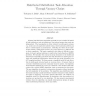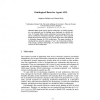1047 search results - page 95 / 210 » Learning the required number of agents for complex tasks |
ICRA
2003
IEEE
14 years 1 months ago
2003
IEEE
Existing task allocation algorithms generally do not consider the effects of task interaction, such as interference, but instead assume that tasks are independent. That assumptio...
AAAI
2000
13 years 9 months ago
2000
Just as actions can have indirect effects on the state of the world, so too can sensing actions have indirect effects on an agent's state of knowledge. In this paper, we inve...
IISWC
2008
IEEE
14 years 2 months ago
2008
IEEE
The design and evaluation of microprocessor architectures is a difficult and time-consuming task. Although small, handcoded microbenchmarks can be used to accelerate performance e...
CAISE
2003
Springer
14 years 1 months ago
2003
Springer
Abstract. Multi-Agent Systems (MAS) architectures are gaining popularity over traditional ones for building open, distributed or evolving software. To formally define system archit...
AAI
1998
13 years 7 months ago
1998
Traditional AI research has not given due attention to the important role that physical bodies play for agents as their interactions produce complex emergent behaviors to achieve ...


